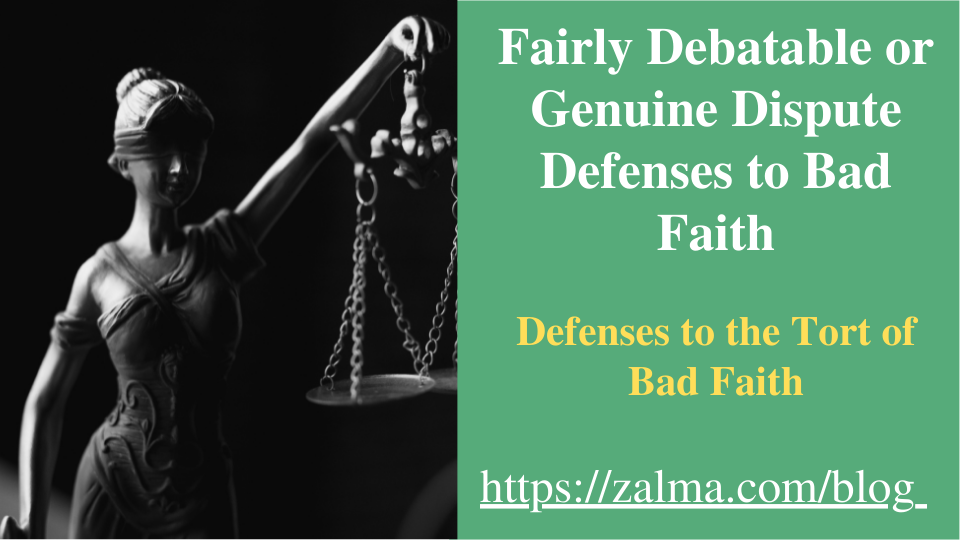-
News Feed
- EXPLORE
-
Pages
-
Groups
-
Events
-
Blogs
-
Marketplace
-
Offers
-
Jobs
-
Developers
Fairly Debatable and Genuine Dispute Defenses to the Tort of Bad Faith

Defenses to the Tort of Bad Faith
Read the full article at https://lnkd.in/g7WHpu5T and see the full video at https://lnkd.in/gqaQpMuK and at https://lnkd.in/gCczVZzf and at https://zalma.com/blog plus more than 4250 posts.
A bad faith claim should be dismissed on summary judgment if there was a genuine dispute on a reasonable factual dispute or an unsettled area of insurance law. In determining if a dispute is genuine, the court does not decide which party is “right” as to the disputed matter, but only that a reasonable and legitimate dispute actually existed. [Chateau Chamberay Homeowners Ass’n v. Associated Int’l Ins. Co., 90 Cal. App. 4th 335, 348 n.7 (2001), as modified on denial of reh’g (July 30, 2001).
Insurers, afraid of a bad faith judgment, should consider the fact that there can be no bad faith claim for denial of coverage if the insurer was correct as a matter of law in denying coverage.
The tort of bad faith is like the mythical vampire—it hides in the dark. The law of unintended consequences applies to the situation and the reasons for its creation – bad acts by insurers costing innocent insureds to suffer was not cured by the tort of bad faith.
If the insured’s claim was fairly debatable the insurer is entitled to deny it without risking a bad faith suit. If a genuine dispute does exist governing the coverage question, the insured’s claim is fairly debatable and the tort claim for bad faith based upon the insurer’s refusal to pay the claim may not be maintained.
When a claim is “fairly debatable,” an insurer is entitled to debate it. A determination whether a particular claim is fairly debatable implicates the question whether the facts necessary to evaluate the claim are properly investigated and developed or recklessly ignored and disregarded. An imperfect investigation alone is not sufficient cause for recovery if the insurer in fact has an objectively reasonable basis for denying the claim.
It seems clear to me that the tort of bad faith has served its purpose. It should be killed. The courts of the United States should return to the common law of contracts where the insured is provided the benefits of the contract of insurance promised by the policy.
ZALMA OPINION
For many years after the inception of the tort of bad faith there were few defenses – other than the basic contract terms and conditions – to defend against claims of the tort of bad faith. The “fairly debatable” or “genuine dispute” defenses have changed the law in favor of insurers and provided a potential defense that should make it easier for an insurer to defend against the tort.
(c) 2022 Barry Zalma & ClaimSchool, Inc.
Barry Zalma, Esq., CFE, is available at http://www.zalma.com and [email protected].
Subscribe to Zalma on Insurance at locals.com https://zalmaoninsurance.local.com/subscribe.
Subscribe to Excellence in Claims Handling at https://barryzalma.substack.com/welcome.

We are 100% funded for October.
Thanks to everyone who helped out. 🥰
Xephula monthly operating expenses for 2024 - Server: $143/month - Backup Software: $6/month - Object Storage: $6/month - SMTP Service: $10/month - Stripe Processing Fees: ~$10/month - Total: $175/month
- Art
- Causes
- Crafts
- Crime
- Dance
- Drinks
- Film
- Finance
- Fitness
- Food
- Games
- Gardening
- Health
- Home
- Literature
- Music
- Networking
- Paranormal
- Other
- Politics
- History
- News
- Party
- Science
- Religion
- Shopping
- Sports
- SyFy
- Politically Incorrect
- Philosophy
- Theater
- Technology
- Wellness



